The Monster in the Box / Ruth Rendell
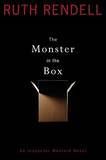 Scribner / October 2009
Scribner / October 2009
Reviewed by: Rick R. Reed
Synopsis: The Monster in the Box is the latest addition to Ruth Rendell's classic Inspector Wexford series. Rendell’s latest entry in the series takes Inspector Wexford back to his days as a young policeman, and to the man he has long suspected of serial murder.
Outside the house where Wexford investigated his first murder case – a woman found strangled in her bedroom – he noticed a short, muscular man wearing a scarf and walking a dog. He gave Wexford an unnerving stare. Without any solid evidence, Wexford began to suspect that this man – Eric Targo, he learned – was the killer.
Over the years there are more unsolved, apparently motiveless murders in the town of Kingsmarkham, and Wexford continues to quietly suspect that the increasingly prosperous Targo – van driver, property developer, kennel owner, and animal lover – is behind them.
Now, half a lifetime later, Wexford spots Targo back in Kingsmarkham after a long absence. Wexford tells his longtime partner, Mike Burden, about his suspicions, but Burden dismisses them as fantasy. Meanwhile, Burden's wife, Jenny, has suspicions of her own. She believes that the Rahmans, a highly respectable immigrant family from Pakistan, may be forcing their daughter, Tamima, into an arranged marriage — or worse.
In The Monster in the Box, the twenty-second book in the Inspector Wexford series, fans will be thrilled to meet the now-aging inspector in the robust early days of his career. For new readers, no introduction to this spectacular writer and her compelling protagonist could be finer.
Review: I admit it: I am in love with a woman. Ruth Rendell has long been one of my literary obsessions, a woman at whose feet I unabashedly kneel and worship. Time magazine has called her, “the best mystery writer in the English-speaking world” and this is not hyperbole. She is. She really is.
Ruth Rendell has two personas. One is Barbara Vine, who writes compelling psychological thrillers (which I prefer) and the other is Rendell, the author of the Inspector Wexford mystery series (Wexford is named after a place in Ireland Rendell visited shortly before coming up with the idea for the first Wexford book, From Doon with Death).
I mention the first book in a series that spans decades and encompasses more than twenty stories because with The Monster in the Box, Rendell charts the territory of Wexford’s past. Aside from being a provocative mystery whose solution is never obvious but surprising and ultimately logical, Rendell gives us a Wexford who is still sharp, but who is comfortable in his domestic life and still has a keen eye for social causes. It makes sense that the aging Wexford, nearing retirement, would be motivated to look into his past: his first loves, meeting his wife Dora, and the England of his youth. He is motivated not only because he suspects a serial killer who has tormented him for years with improvable murders has possibly returned, but also because he has reached the stage of life where one turns to one’s past and examines it. The Monster in the Box, while a cracking good mystery, is also a meditation on life in the latter years and the title is a nod to the self-help of putting a difficulty in an imaginary box and setting it aside. The serial murderer at the book’s center is Wexford’s monster and, although he had been able to put this monster in a box (it has been highly frustrating for Wexford not to prove the killer’s culpability), circumstances have released the monster once more. One of the most fascinating thing Rendell does in this latest outing with Wexford is that she makes us wonder if the old Chief Inspector isn’t beginning to lose it…is the killer really a killer, or is Wexford beginning to mistake his own intuition for solid detective work?
Rendell is a school inspiring authors should enroll in. She knows how to create characters, craft believable dialogue, pace her plots so that one is compelled to continue turning the pages, and she wraps all this up in prose so simple and elegant that it ceases to exist. Instead, her stories come to life in the reader’s mind. The Monster in the Box is no exception, which is why Ruth Rendell is both a treat for readers and writers alike.
Purchase The Monster in the Box by Ruth Rendell.
Columnist Rick R. Reed is the author of eleven novels and has short fiction in more than twenty anthologies. He lives in Seattle, WA. Find out more about the author at his official author website.
Kelland / Paul G. Bens Jr.
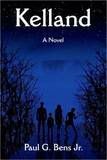 Casperian Books / September 2009
Casperian Books / September 2009
Reviewed by: Vince A. Liaguno
Kelland is likely to be the best book you might not read this year. With its non-descript cover, vague synopsis, and limited small press visibility, it would be easy for this compelling, beautifully written debut novel from native Kentuckian Paul G. Bens to be overlooked. And that would be a sincere shame.
Kelland is a gorgeous, genre-defying novel of heartrending truth, a work that builds slowly and confidently toward a page-turning climax that will leave you breathless in anticipation of the inevitable events one is never quite sure how will play out. This speculative fiction tour de force blends the concept of human interconnectivity with the devastating effects of childhood trauma and the limits of forgiveness – a literary fusion of Paul Thomas Anderson’s Magnolia meets Sleepers crossed with The Boys of St. Vincent.
Readers are introduced to five disparate strangers: a pair of Vietnamese brothers, a precociously devout altar boy, and a teenage boy whose web journals provide clues to a grieving mother trying to piece together the mystery behind an unthinkable tragedy. The common thread is the chameleon-like title character that appears to each of the characters as an agent of revelation, seemingly there to help each uncover their own truth. In the hands of a lesser writer, the concept of this conscience/spirit guide character could come across as gimmicky or ambiguous, but Bens ably pulls off this mingling of reality and otherworldliness without missing a beat. In its manifestation as a kindly priest helping an anguished mother unravel the mystery of her son’s suicide, the Kelland being explains the resiliency and flexibility of human interaction:
“We all exist in relation to others and we become what is needed in relation to them. I’m no different. I’ve been a friend, a musician, a little boy, a shoulder to cry on, a lover, a son, someone to guide the way. Different times, different people, different needs.”
Kelland is told in vignettes that flash forward and backward in time, during which Bens deftly develops each character by slowly and methodically peeling back the many layers of these seemingly separate stories. The generous payoff comes as these various narrative threads are pulled together in a masterful way that belies the fact that this is a debut novel.
Bens is a writer to watch. There are hints of literary experimentation at work here in this intricately and tightly-plotted novel that conjure up Michael Cunningham’s The Hours and Specimen Days. His prose is controlled yet – although there is nary an extraneous word to be found – descriptively lush:
“Music was chaos amongst order. Those black blotches meant nothing without the staff, and even then they were foreign to most, a puzzle, some secret code broken by many but understood by a few. Move just one of those notes up or down, adjust the key or alter the signature, and love could become hate, despair could be lifted, ugliness just might bloom into beauty. It was life really, the notes standing in for decisions and words, the clefs and the shapes revealing the feeling, the intent, and the attitude.”
If there’s one book you read this year that doesn’t shout from the bookshelves with a compelling cover or grab your attention with a slick book trailer, one that you read purely on recommendation, then let that book be Kelland. Gentle in approach but devastating in its humanity, Kelland will insinuate itself into your subconscious, surprise you with its maturity, and then pull the rug out from under you with its truth.
Purchase Kelland by Paul G. Bens Jr.
Ghostwriter / Travis Thrasher
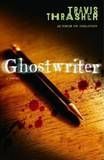 Faith Words (Hachette Book Group) / May 2009
Faith Words (Hachette Book Group) / May 2009
Reviewed by: Martel Sardina
Travis Thrasher told me not to doubt that his latest novel, Ghostwriter, was horror despite the fact that most of the other books his publisher puts out are shelved in the Christian Fiction or Inspirational section of the bookstore.
I flipped the book over and read the premise. Dennis Shore, a bestselling horror author, suffers from writers’ block after his wife’s death. He steals a fledgling writer’s work, and claims it as his own. Shore thinks he’s gotten away with it, until he’s confronted by Cillian Reed, the young man he stole from. What starts as harassment spirals out of control as Dennis realizes that more than his career as at stake. His actions may have deadly consequences. And while the premise sounded good, I knew from prior attempts to read so called “Christian horror” that this story had the potential to turn me off if Trasher got the balance of “Christian” versus “horror” wrong.
Thrasher quickly establishes Dennis Shore’s empty world. He lost his wife to cancer. His daughter is off to college. Dennis is left alone in a big, Victorian house with painful memories and an inability to translate any of his feelings into words on the page. He finds a manuscript sent by Cillian Reed, a fan looking for feedback. Shore reads it and discovers that it is quite good. His editor and publisher want a new book. His deadline is approaching. Dennis knows that he can’t deliver. He knows that it is wrong to pass off Cillian’s work as his own, but feels he has no choice. He’s only doing what he needs to keep his writing career alive.
Before the stolen book is published, Dennis receives warnings to not allow the book to be released. Dennis is not frightened. Would anyone really believe that a bestselling author would ever need to steal someone else’s work? After the book is released, Dennis is confronted at a signing by Cillian Reed, who used to be his biggest fan. Cillian doesn’t publicly reveal Dennis’ secret, preferring to torment Dennis in other ways, like pulling pranks that aren’t particularly funny.
Dennis launches his own investigation into Cillian’s past. When he finds out the Cillian died in car accident several years ago, he begins to doubt his sanity. Could not dealing with his grief over Lucy’s death have caused this? Or is there a supernatural force at work?
Thrasher skillfully blends action, mystery and suspense as he takes readers on a supernatural thrill ride. Much of the violence is implied, meaning the kills happen offstage. Thrasher’s descriptions of either what happens just before or just after those moments ramps the tension up, making it hard to want to put the book down. What Thrasher leaves to the reader’s imagination is what’s truly frightening. And as for the balance of “Christian” versus “horror,” I actually found myself wanting a little more of the former by the story’s end. The ending would have worked better for me had Thrasher gone a bit farther in terms of Dennis seeking redemption for stealing Cillian’s manuscript.
And just so we’re clear, Travis Thrasher does write horror. If you can’t find Ghostwriter in the horror section of your local bookstore, take the time to locate it wherever it’s shelved.
Purchase Ghostwriter by Travis Thrasher.
Futile Efforts / Tom Piccirilli
 Cemetery Dance Publications / December 2009
Cemetery Dance Publications / December 2009
Reviewed by: Blu Gilliand
Okay, just listen to this:
"Sometimes the insanity you leave behind just settles in and waits for a new ear to crawl into."
That’s from “Shadder.” And this:
"Nell moved with the consistency and gravity of the setting moon."
That’s from “Jonah Arose.” Then there’s this one:
"He used glazes between the stratum of color so light reflected through each coating. The pigments appeared suspended, as if ready to break from the landscape and splash free. The physical substance of the picture seemed less important than the fact that it was chosen as a vehicle of expression. Shadow and relief were what counted most. His style was fiery, exhibiting life, movement, and harmony but the boundaries were softened to blurs and smoke."
That’s from “Jesus Wrestles the Mob to Feed the Homeless.” These passages were written by Tom Piccirilli, and the stories they come from all appear in his new Cemetery Dance collection Futile Efforts. If these excerpts alone aren’t enough to convince you of the quality and craft inherent in each page of this collection, I doubt that anything I say will make a difference.
I will go ahead and say this, though – Piccirilli is a prose writer with a poet’s soul. (Oh, and of course he’s a poet, too – an accomplished one at that, as evidenced by the 45 poems that stuff the back end of this collection.) His words cut and wound, leaving marks and scars for the reader to pick at for days afterward. Take the above-quoted “Shadder” for example – it’s a story about a haunting that will haunt you for days afterward. Even through the next few stories, I couldn’t shake “Shadder.” My advice is to read that one, then stop for a while and let it sink in.
Actually, that’s probably the best way to approach all of these stories. Read one, then put the book down and study on it for a while. You don’t want to wash away the taste too quickly by diving into the next story immediately. These aren’t one-note shockers with a twist at the end (not that there’s anything wrong with those). These are layered experiences, ones that are to be sipped and savored individually, not bolted down in one quick gulp.
Piccirilli publishes so much stuff in so many places, it’s great to have so much of it pulled together in one collection. Kudos to Cemetery Dance for gift wrapping some of his best for us – let’s hope they do it again some time.
Purchase Futile Efforts by Tom Piccirilli.
Morbid Curiosity Cures the Blues / Edited By Loren Rhoads
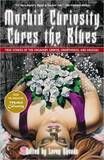 Scribner / October 2009
Scribner / October 2009
Reviewed by: Martel Sardina
For ten years, Loren Rhoads took readers of Morbid Curiosity magazine on a journey exploring true tales of the “unsavory, unwise, unorthodox and unusual.” Had I known of the magazine’s existence when it was being published, I surely would’ve been a fan. I learned of the magazine after its run, while discussing a story idea with a collegue at the World Horror Convention in Salt Lake City. My collegue’s advice was, “Get in touch with Loren Rhoads and see if she still has a copy of the essay about the guy who used to work for the Coast Guard.”
The essay in question, “The Jumper and The Crabs” by Kalifer Deil, is about a young Coast Guard recruit’s first look at death when charged with retrieving a “floater” from the bay near Sausalito, CA. Imagine for a moment, not only what the experience of seeing a dead body for the first time would be like, but also having to touch the body in an attempt to find clues that might identify the deceased. As the chef’s assistant, it wasn’t exactly the type of assignment he was expecting. But it was hardly the strangest thing that happened to him that day. In the process of retrieving the body, Deil and his boss, Van, also caught a bucket full of crabs. And as Deil soon learned, when someone asks “What’s cooking?” volunteering information about where dinner came from isn’t strictly necessary.
I was pleased to see that Diel’s story made the cut when Rhoads had to decide which of the over three hundred essays she originally published would be included in this anthology.
The anthology begins with a brief history of how Rhoads came to publish the magazine in the first place. Her choices are subcategorized in six sections: Childhood’s End: Growing Up Morbid, Far From Home: Morbid Curiosity on the Road, Gainful Employment: The Morbid Things People Do For Money, Curious Behavior: The Morbid Catchall Category, Medical Adventures: Morbid Medicine, and Beyond Death: Exploring Behind the Curtain. The essays range in tone from humorous to melancoly to frightening.
In the section Far From Home, Brian Thomas describes his experience of visiting Auschwitz. At one point in the tour, the guide showed Thomas a room containing four brick-walled booths in various states of construction. The one closest to him was a single layer of bricks forming a square outline on the floor. The second was knee high. The third was shoulder high. The final booth reached from floor to ceiling and had an 18 x 24-inch door at the bottom. These booths were some of the gas chambers used by the Nazis to exterminate the Jews. The guide invited those on the tour to step inside the chambers if they wished. A few stood in the knee high booth but none dared to try the others. Thomas lagged behind as the rest of the group proceded on the tour and decided to give the fully enclosed booth a try. While one can argue whether or not what happened to him once inside was the by product of his imagination or a supernatural encounter, Thomas renders the experience with vivid details. At times, he gives readers the sounds and smells bringing life to his tale only to show what the other side might have been like when he is deprived of certain sensory data while inside the chamber. By the end of the tour, Thomas is forever changed and readers should be as well.
In the Medical Adventures section, T.M. Gray recounts her experience as a victim of “Anesthesia Awareness.” This phenomena is a closely guarded secret in the medical community. No one wants to admit that there are times when anesthesia during surgery doesn’t work as it should. In Gray’s case, she was awake, aware, and in pain during the procedure being performed but was unable to move or communicate with the doctors to let them know that the anesthesia didn’t work. After the procedure was over and she regained her ability to communicate, she told the doctors of her experience. The doctors tried to convince her that either she was dreaming or she was crazy. Not only did she have to recover from the problem that she initially sought treatment for but also had to battle to get care for the post-traumatic stress that occurred as a result of being awake during the surgery.
Rhoads ends with her own essay, “The Mortician’s Gift,” and leaves readers to ponder her theory about how experiencing a little “real” horror can change your perspective on life and hopefully make you appreciate what you have.
Morbid Curiosity Cures The Blues is a must read for those who want a glimpse into the dark side of people’s lives. With forty essays to choose from, there is something to suit everyone’s tastes. From the cradle to the grave and beyond, these stories tantilize and terrify.
Purchase Morbid Curiosity Cures The Blues, edited by Loren Rhoads.
Urge to Kill / John Lutz
 Pinnacle / July 2009
Pinnacle / July 2009
Reviewed by: Rick R. Reed
Synopsis: For a killer, once is never enough.
Homicide detective Frank Quinn can't stay retired when a new breed of murdering madman is on the prowl. In a city terrorized by bloody brutality, Quinn and his team hunt a psychopath who lures beautiful women into a night of unbridled passion, then wakes them to a vicious, drawn-out death. Stumbling over a trail of horribly defiled bodies, Quinn can't seem to catch up to the killer-because the killer is about to catch up to him...
Review: Urge to Kill is one of those books I just couldn’t wait to return to. A seamless, heart-pounding plot, vivid characters, a perfect sense of place (Manhattan in the summer), and a mystery wrapped in some of the most carefully-constructed suspense I’ve yet to witness makes Urge to Kill a book that’s hard to fault.
John Lutz is an old hand at thriller and gory mayhem. Maybe that’s why Urge to Kill is an almost perfect exercise in terror and suspense. Lutz knows that making us care about his characters is key to our investment in his story. Even though the tale is sensational – a serial killer is preying on lonely Manhattan women, seducing, then brutally murdering them – it’s the characters that keep us coming back for more. Lutz has a keen eye for detail, so that we not only know, with just a few sentences, what our heroes and anti-heroes look like, but how they will behave and think. He writes dialogue as if the characters are talking to him in his head. And maybe they are. Each has its own distinctive voice.
Lutz also weaves a complex and surprising mystery into the story. It would have been enough for a lesser writer to build a thriller around a serial killer preying on single women, hunting them down and gutting them like deer, but Lutz adds another layer to Urge to Kill. In that same hot summer, there is also a deadly game of hunter and hunted going on in the Big Apple. Men armed with the same obscure handgun are hunting each other down and killing; the winner is the one who gets off the deadly shot first. But can the serial killer preying on women be the same man who is masterminding these deadly duels? Lutz doesn’t let us know the answer to the mystery until the final, breathless pages unfold. Like any master mystery/thriller writer, Lutz reveals the solution to the mystery bit by bit and putting it all together before Lutz is ready to spill the goods would take a genius whodunit solver.
An array of fascinating points of view propel the story at a brisk pace, which seems short even though it’s upwards of 400 pages. Lutz endows each character with a distinctiveness that makes them all, if not sympathetic, then fascinating. Urge to Kill is one of those breathless reads that keeps one up all night, not only to find out what happens next, but to make sure those sounds one hears at night are not just the house settling, but something more sinister.
Purchase Urge to Kill by John Lutz.
Columnist Rick R. Reed is the author of eleven novels and has short fiction in more than twenty anthologies. He lives in Seattle, WA. Find out more about the author at his official website.
Mama Fish / Rio Youers
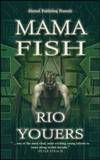 Shroud Publishing / June 2009
Shroud Publishing / June 2009
Reviewed by: Vince A. Liaguno
There are writers who are so talented that they can make you see the external manifestations of horror in all their full-blown Technicolor ghastliness. And then there are even more talented writers who make you feel horror’s heartrending internal effects. Rio Youers falls squarely into the latter category.
Mama Fish is proof that big things come in small packages. This tightly-written 91-page novella follows protagonist Patrick Beauchamp, from his days trying to befriend Harlequin High School’s resident misfit to his adult life more than two decades later. The story begins in 1986, with Patrick fascinated by the class oddball, Kelvin Fish, “the square peg, the kid that doesn’t fit.” As Patrick tries to reach the reticent Kelvin, he discovers that despite his own ability to fit in by going through all the motions of teenage convention – debate club, team sports – that he’s also a square peg in a world full of round holes. This unspoken kinship leads to Patrick’s desire to know more about Kelvin, and his speculation about the strange boy’s home life and family brings him to a pivotal moment involving an ill-fated encounter with bullies that leads to an increasingly bizarre (and ultimately tragic) sequence of events.
Mama Fish is a hard work to categorize – there are decidedly horrific moments, with bits of science fiction and surrealism thrown in amongst the richer coming-of-age material. To Youers credit, he uses the parallel narrative threads between teenage Beauchamp and adult Beauchamp to maintain a steady pace in which the tension mounts and pages turn faster. He imbues Mama Fish with a deceptive literary lushness that belies his crisp, economical prose:
Belief is coupled with the soul, so it stands to reason that if the soul is eternal, so too is belief. However, this is not the case; age generates wisdom, and wisdom engulfs belief. With every morsel of fact or reality, our soul loses its shine. We die inside.
Mama Fish is a highly readable yet thematically heavy story that takes on everything from the loneliness of the teenager’s search for connection and self to the gap that separates generations, from the injustices of fate to the rectifying power of karma. It’s the speculative fiction bridge between The Breakfast Club and The Big Chill, full of truth, perspective, and an emotional resonance that will haunt you long after the last shocking twist.
Purchase Mama Fish by Rio Youers.




